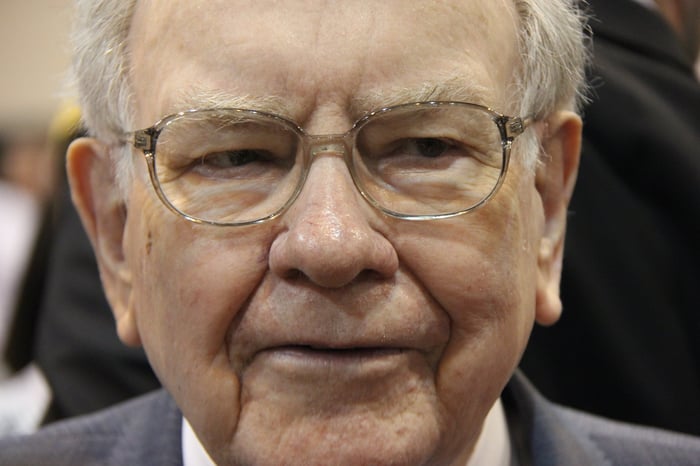|
|
|

|
|||||

|
|
The Oracle of Omaha will hand the reins to Greg Abel and step down as Berkshire Hathaway CEO when 2025 ends.
Though Abel plans to follow in the footsteps of Buffett and late right-hand man Charlie Munger, changes are inevitable.
Expect a new sector to be on the radar after Buffett retires, and look for a few core holdings to (eventually) be shown the door.
For the better part of the last six decades, Warren Buffett has exemplified investing excellence. Though he hasn't outrun the benchmark S&P 500 (SNPINDEX: ^GSPC) in each of his 60 years as CEO of Berkshire Hathaway (NYSE: BRK.A)(NYSE: BRK.B), he's crushed Wall Street's major stock index on a cumulative basis, with a nearly 6,000,000% aggregate return for his company's Class A shares (BRK.A) compared to a roughly 44,000% total return, including dividends, for the S&P 500.
But as poet Geoffery Chaucer once said eight centuries ago, "all good things must come to an end."
Where to invest $1,000 right now? Our analyst team just revealed what they believe are the 10 best stocks to buy right now. Continue »

Berkshire Hathaway CEO Warren Buffett. Image source: The Motley Fool.
During Berkshire's annual shareholder meeting in early May, the aptly named Oracle of Omaha announced his intent to step down from the CEO role at the end of the year and, with board approval, hand the reins over to predetermined successor Greg Abel. The end of Buffett's tenure as CEO is exactly 100 days away, as of today, Sept. 23.
For his part, Abel has vowed to stick to the investing philosophies that made Warren Buffett and late right-hand man Charlie Munger such phenomenal investors. This means focusing on the long-term, buying back Berkshire Hathaway's stock when appropriate, and being an unwavering value investor.
But changes are inevitable.
When Warren Buffett retires 100 days from now, three big changes are coming to Berkshire Hathaway.
Among the dozens of books written about Berkshire Hathaway's billionaire chief, arguably no characteristic defines him more than his desire to buy great companies and hold them for a long, long time. While it's unlikely that we'll see significantly shorter hold periods once Buffett retires from the CEO role at the end of 2025, there's a good chance his longtime "investing lieutenants," Todd Combs and Ted Weschler, become more active.
For example, Buffett often took a couple of quarters to build up a position he had conviction in, or to exit a stake that no longer met his investment criteria. Adding 5% to an existing position here, or selling 3% of an existing position there, isn't something you'd traditionally see from a Warren Buffett-run portfolio. The trades he oversaw had a clear purpose: enter or exit a stock.
In recent years, Combs and Weschler have become more active on the trading front. Though the overwhelming majority of stocks purchased are being held for multiple years, it's not uncommon for this dynamic duo to slowly add to or reduce a position.
Don't be surprised if Berkshire Hathaway's Form 13F filings following Buffett's retirement feature considerably more purchases and reductions than we're historically used to seeing.

Image source: Getty Images.
The second change Berkshire Hathaway shareholders and Wall Street can expect is a renewed focus on healthcare stocks.
Historically, Berkshire's largest holdings have often been found in the financial or consumer staples sectors, which are the two sectors Buffett understands best. Though Apple (NASDAQ: AAPL), a tech stock, is currently Berkshire's largest holding (and has been for years), the Oracle of Omaha views it more as a provider of consumer goods (iPhones, iPads, Macs, and so on) and has been enamored with the incredible loyalty consumers have shown to the Apple brand.
It's been more than a decade since healthcare played a meaningful role in Berkshire Hathaway's investment portfolio. At 95 years old, Buffett doesn't have the time or energy to keep up with clinical trials and regulatory news. Once he retires, Abel, Combs, and Weschler are likely to lean on healthcare stocks for investment purposes.
The reason is simple: the stock market is historically pricey and healthcare stocks are comparatively inexpensive. Based on data from Yardeni Research, the forward price-to-earnings (P/E) ratio of the S&P 500 is 22.7, while S&P 500 healthcare stocks are sporting an average forward P/E of just 16.4, as of Sept. 16. With the exception of energy, healthcare has the lowest forward P/E of any S&P 500 sector.
For example, pharmaceutical stocks remain highly attractive. Pfizer (NYSE: PFE), which was briefly held by Buffett's company in late 2020 and early 2021 (likely a trade made by Combs or Weschler), can be purchased for a forward P/E of less than 8, equating to a 24% discount to its average forward earnings multiple over the last half-decade. It's also doling out an S&P 500-crushing yield north of 7%! This is the type of healthcare stock Berkshire Hathaway's investment team may gobble up in the post-Buffett era.
The third big change Wall Street and investors should expect following the retirement of Warren Buffett is the eventual disposition of one or more of Berkshire Hathaway's core holdings.
To be crystal clear, I'm not talking about the eight "indefinite" holdings Warren Buffett described in his 2023 annual letter to shareholders. In that letter, he referred to his company's longest-held stocks, Coca-Cola and American Express, along with Occidental Petroleum, and the five Japanese trading houses, as "indefinite" holdings. These eight stocks aren't going anywhere.
However, No. 1 holding Apple is far from safe. Despite having a loyal shareholder base and a phenomenal management team led by CEO Tim Cook, Apple's physical device sales stalled out for three consecutive years.
When Buffett and his team first began building up Berkshire's stake in Apple in the first quarter of 2016, shares of company were trading at a forward P/E of 10 to 15, with sales growth expected in the high-single-digits if not low double-digits. Today, Apple is valued at 36 times trailing-12-month earnings per share.
It no longer meets the value criteria that Buffett or his investment team typically look for, which may explain why 69% of Berkshire's stake in Apple has been sold since Sept. 30, 2023. Don't be surprised if Berkshire's selling of Apple stock continues/accelerates after Buffett retires.
It's also possible financial juggernaut Bank of America (NYSE: BAC) gets shown the door.
BofA, as Bank of America is more commonly known, was added to Berkshire's portfolio in August 2011 in the form of preferred stock. Prior to Buffett converting BofA warrants into the common stock Berkshire owns today, Bank of America was valued at as much as a 68% discount to its book value. Today, it trades at a 38% premium to its book value. It's no longer the slam-dunk bargain to book value that it once was.
While nothing suggests Berkshire Hathaway won't continue to be a great investment in the post-Buffett era, things are going to look different.
Before you buy stock in Berkshire Hathaway, consider this:
The Motley Fool Stock Advisor analyst team just identified what they believe are the 10 best stocks for investors to buy now… and Berkshire Hathaway wasn’t one of them. The 10 stocks that made the cut could produce monster returns in the coming years.
Consider when Netflix made this list on December 17, 2004... if you invested $1,000 at the time of our recommendation, you’d have $661,694!* Or when Nvidia made this list on April 15, 2005... if you invested $1,000 at the time of our recommendation, you’d have $1,082,963!*
Now, it’s worth noting Stock Advisor’s total average return is 1,067% — a market-crushing outperformance compared to 190% for the S&P 500. Don’t miss out on the latest top 10 list, available when you join Stock Advisor.
*Stock Advisor returns as of September 22, 2025
Bank of America is an advertising partner of Motley Fool Money. American Express is an advertising partner of Motley Fool Money. Sean Williams has positions in Bank of America and Pfizer. The Motley Fool has positions in and recommends Apple, Berkshire Hathaway, and Pfizer. The Motley Fool recommends Occidental Petroleum. The Motley Fool has a disclosure policy.
| 14 min | |
| 2 hours | |
| 3 hours | |
| 4 hours | |
| 4 hours | |
| 6 hours | |
| 7 hours | |
| 7 hours | |
| 8 hours | |
| 8 hours | |
| 8 hours | |
| 8 hours | |
| 8 hours | |
| 9 hours | |
| 9 hours |
Join thousands of traders who make more informed decisions with our premium features. Real-time quotes, advanced visualizations, backtesting, and much more.
Learn more about FINVIZ*Elite